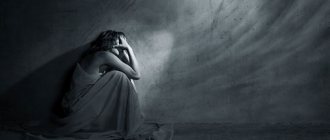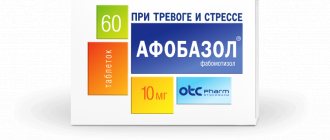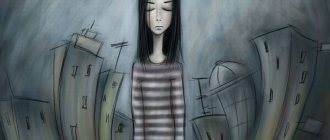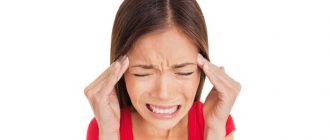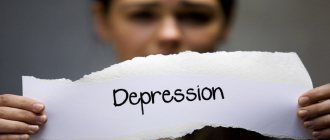Depression is one of the most common diseases. In terms of prevalence, it is second only to cardiovascular diseases. And of all those suffering from depression, no more than 20% seek qualified help.
In this article we will tell you about all the drugs used to treat depression.
All medications with antidepressant effects can be divided into several groups:
- Antidepressants.
- Normotimic drugs.
- Neuroleptics.
- Tranquilizers.
- Nootropics and metabolic agents.
- Herbal remedies.
- Amino acids.
- Psychostimulants.
Normotimic drugs
Medicines in this group have an antidepressant effect only in cases where the depressive state is caused by chronic affective diseases, such as bipolar affective disorder (BD, manic-depressive psychosis), cyclothymia, dysthymia, schizoaffective disorder. Most commonly used medications:
- Carbamazepine (finlepsin)
- Depakine chrono
- Lamotrigine (Lamictal)
- Lithium carbonate
Paroxetine
Paroxetine is an antidepressant with a good therapeutic effect, relieves phobias and obsessive thoughts. The drug is prescribed for panic attacks, anxiety, social phobia, and obsessive-compulsive disorder. A noticeable effect of treatment occurs after 2-4 weeks of taking Paroxetine.
Paroxetine
OZON, Russia
Depression of all types, including reactive and severe depression, as well as depression accompanied by anxiety.
In the treatment of depressive disorders, paroxetine is approximately as effective as tricyclic antidepressants. There is evidence that paroxetine may provide good results in patients in whom standard antidepressant therapy has failed. Taking paroxetine in the morning does not adversely affect the quality or duration of sleep. In addition, sleep may improve as paroxetine treatment works. When using short-acting hypnotics in combination with antidepressants, no additional side effects occurred. In the first few weeks of therapy, paroxetine is effective in reducing symptoms of depression and suicidal ideation. Results from studies in which patients took paroxetine for up to 1 year showed that the drug was effective in preventing relapses of depression. Obsessive-compulsive disorder Paroxetine from 247
405
- Like
- Write a review
Neuroleptics
Despite the fact that most antipsychotic drugs depress the nervous system, among them there are drugs with antidepressant effects:
- Flupenthixol (fluanxol).
It has an antidepressant effect only when administered in small doses (less than 2 mg per day).
- Aripiprazole.
Effective for depression in bipolar affective disorder and schizitypal disorders.
- Levomepromazine (tizercin).
Prescribed for endogenous depression accompanied by insomnia.
Tryptophan
Tryptophan is a homeopathic antidepressant that helps fight irritability, apathy and anxiety. The active ingredients of the drug are vitamins B5 and B6, as well as the amino acid L-tryptophan. L-tryptophan normalizes the functioning of the nervous system, improves sleep quality (by regulating the production of melatonin). Tryptophan has a complex effect on the body, so it helps to cope with depression more easily. After taking this antidepressant, negative thoughts completely go away, the person becomes calmer, irritability decreases and anxiety disappears.
Calm Formula Tryptophan
Evalar, Russia
A drug for the treatment of diseases of the nervous system.
from 264
571
- Like
- Write a review
Let us emphasize once again that over-the-counter antidepressants are not very effective, so they should be taken only at the initial stage of the development of depression, so as not to aggravate the situation and prevent complications of the condition. Depression is not a serious problem that requires immediate treatment. If you notice that you have lost interest in your usual activities, you have sleep disturbances, you begin to cry often, or obsessive thoughts appear - consult a doctor immediately.
Tranquilizers
- Bromodihydrochlorophenylbenzodiazepine (phenazepam).
The drug of choice for neurotic conditions with depression and post-stress conditions. That is, in cases where short-term treatment is required.
- Clonazepam.
Strong anti-anxiety and sedative effect. When taken for a long time it causes dependence.
- Alprazolam.
Prescribed for anxiety and depression. Recommended for short courses (no more than 10 days) due to the risk of developing addiction and dependence.
Antidepressants
Should I take antidepressants for severe depression? Many people believe that such drugs are addictive. If previously drugs that could cause addiction and drug dependence were used in psychotherapy, today new generation drugs are used that affect the human body and psyche more gently and sparingly.
Among the reasons for mistrust in the use of antidepressants for depression is the fact that if the course of treatment is interrupted, a person may feel worse. If withdrawal symptoms occur, this indicates incorrect discontinuation of the prescribed drug. You should not perceive this reaction of the body as dependence on pills.
If you stop the artificial synthesis of brain neurotransmitters, their quantity in the human body will drop sharply. Patients feel that their depression or anxiety disorder is returning as anxiety increases. Any changes in your condition should be reported to your doctor. The specialist knows how to smoothly discontinue the prescribed medication. In combination with psychotherapy, pharmacotherapy works well, giving long-term results.
There are several groups of medications for anxiety and depression.
Tricyclic
The first group includes medications that have a three-cyclic structure; they are not sedatives and prevent the immediate breakdown of neurotransmitters (serotonin and norepinephrine). They do not disappear from the nerve endings, their synthesis increases, as does the amount of serotonin. These medications have a number of contraindications; they are not recommended for people who have kidney and liver diseases, glaucoma, atherosclerosis, or use of narcotic substances.
Monoamine oxidase inhibitors (MAOIs)
MAOIs are monoamine neurotransmitters that regulate our emotions, as well as a number of processes in the brain: attention, cognitive functions, memory, arousal. Due to the inhibition of leasing, the amount of monoamines increases and their accumulation in nerve endings. Some groups of these drugs are contraindicated for pregnant women and people with work that requires concentration, as well as for hypertensive patients.
Selective serotonin uptake inhibitors (SSRIs)
The third group of drugs for the treatment of depression includes selective serotonin uptake inhibitors.
Medicines are prescribed to replenish “happiness hormones”. Do not think that this happens quickly; the process of restoration of neurotransmitters is gradual. SSRIs have one important advantage - when the drugs are abruptly stopped, there is no withdrawal syndrome. Contraindications to their use include diseases of the genitourinary system, as well as alcoholism and drug addiction. If a person has developed alcoholism due to depression, he should not take antidepressants, since alcohol increases the side effects of the medication for depression. Symptoms of the disorder may increase significantly and the condition may worsen. Quite often, psychological reasons cause the development of alcohol dependence; the risk of depression in alcoholics is several times higher than in healthy people. The first group of anti-depression drugs is especially dangerous to combine with ethanol, as this leads to a sharp increase in blood pressure.
Which antidepressant is best for anxiety and depression? Your doctor will answer this question; the choice of medications should always take into account the individual characteristics of the patient’s body.
Do you want to know about the cost of services?
8 call our specialist
Nootropics and Metabolic Aids
The remedies in this group help to get out of a depressive state that has developed against the background of stress, overwork, encephalopathy, the consequences of injuries and poisoning. By improving the blood supply to neurons and energy metabolism within cells, they contribute to the activation of cognitive functions and memory. The most effective drugs in this group:
- Phenibut
- Mexidol
- Aminalon (GABA)
- Piracetam (nootropil)
- Picamilon
- Pyriditol (encephabol)
- B vitamins.
Classification
Tranquilizers without prescriptions or with them in modern pharmacology are classified according to the following criteria:
| Classification type | Description |
| By composition | “Classic” tranquilizers are based on benzodiazepines – substances containing gamma-aminobutyric acid (GABA). It is able, by acting on the receptors of nerve cells (neurons), to reduce their activity. The disadvantage of such drugs is the occurrence of dependence on them. New generation tranquilizers do not contain benzodiazepines, and work due to their safe analogues:
Group 2-1 drugs have a minimal number of side effects and contraindications. For this reason they are available without a prescription. |
| By area of application | All tranquilizers have 5 main properties:
Different drugs have some of these properties more pronounced than others, so they are used for different purposes:
|
| According to the specific effects on the central nervous system | There are “daytime” tranquilizers, in which the sedative, hypnotic and muscle relaxant effects are less pronounced. These drugs are intended to be taken during the daytime, when a person is required to be active, alert, and alert. On the contrary, “night” tranquilizers have sedative, hypnotic and relaxing properties, which are required in the evening and at night. These drugs:
Night tranquilizers are considered less dangerous and are often available without a prescription. However, this does not mean that they can be taken uncontrollably without consulting a doctor. This approach may result in a number of side effects:
|
It is important to consider that any tranquilizers are contraindicated for children. Elderly people should take them in reduced doses and on the recommendation of a doctor.
Are there non-drug treatments for depression?
In addition to medications, there are many non-drug treatments for depression. These are psychotherapy, biofeedback therapy, diet therapy, physical therapy, exercise therapy, reflexology, light and color therapy, sleep deprivation, etc. Most often, a combination of several methods is used to treat depression. For example: psychotherapy + drug treatment, biofeedback therapy + psychotherapy, medication + diet therapy, etc.
You cannot prescribe or use medications on your own. If you or your loved one is faced with the problem of depression, you need to see a psychiatrist or psychotherapist! Only according to his recommendations can you use drugs. Self-medication is life-threatening!
